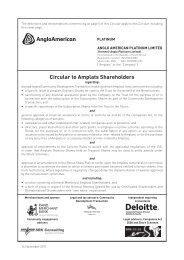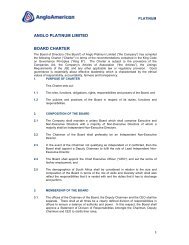Anglo ActionAid 2.indd - Anglo American Platinum
Anglo ActionAid 2.indd - Anglo American Platinum
Anglo ActionAid 2.indd - Anglo American Platinum
You also want an ePaper? Increase the reach of your titles
YUMPU automatically turns print PDFs into web optimized ePapers that Google loves.
THE FACTS<br />
Typical existing house in Motlhotlo<br />
Typical house in new village<br />
<strong>Anglo</strong> <strong>Platinum</strong>’s response<br />
to <strong>ActionAid</strong> allegations
Contents<br />
Executive summary 3<br />
Introduction 5<br />
Section 1 6<br />
Section 2 9<br />
Section 3 16<br />
Final comments 36
Executive summary<br />
<strong>ActionAid</strong>, an international anti-poverty agency, released a report on March 26,<br />
2008 entitled “Precious Metal – The impact of <strong>Anglo</strong> <strong>Platinum</strong> on poor communities<br />
in Limpopo, South Africa.<br />
<strong>Anglo</strong> <strong>Platinum</strong> strives to be a responsible corporate citizen and is distressed by<br />
the serious allegations made by <strong>ActionAid</strong>, particularly given that we believe the<br />
report is extremely one-sided and contains many inaccuracies and distortions.<br />
Therefore it is appropriate to offer all our stakeholders and broader society an<br />
alternative view to set the record straight so that readers can decide for themselves<br />
whether <strong>Anglo</strong> <strong>Platinum</strong> is acting responsibly or not. We welcome the <strong>ActionAid</strong><br />
recommendation that the South African Human Rights Commission undertake a<br />
full investigation as we believe such an investigation would yield a balanced and<br />
positive outcome.<br />
It is unclear from the <strong>ActionAid</strong> report how they selected their research sample<br />
and what their overall research methodology and approach was to ensure unbiased<br />
reporting. Only a few interviews were held with select members of the community<br />
that we already know are not satisfied and who represent a very small proportion<br />
of the more than 200 000 people in the areas covered. It is also worth highlighting<br />
that the report did not include information pertaining to <strong>Anglo</strong> <strong>Platinum</strong>’s other<br />
operations in the Limpopo Province, and particularly the Group’s two biggest<br />
operations namely Amandelbult and Union mine. Reasons for this are not known<br />
and not provided by <strong>ActionAid</strong>. This again highlights the selective nature of the<br />
study.<br />
Mining activities the world over are known to have significant positive and negative<br />
socio-economic impacts on adjacent communities as well as potential negative<br />
impacts on the environment. At <strong>Anglo</strong> <strong>Platinum</strong> we have put in place a number of<br />
governance processes, management systems and reviews to ensure that the positive<br />
impacts are maximized and the negative impacts avoided or minimized. The full<br />
details of these processes and structures are included in our 2007 sustainable<br />
development report, a full electronic copy of which is available at www.<br />
angloplatinum.com.<br />
Despite these processes we do sometimes make mistakes, like any organisation of<br />
our scale, but we have a strong commitment to making a positive difference to the<br />
communities around our operations. We believe that the great majority of<br />
communities associated with us are supportive of mining and the opportunities<br />
which it creates. We have realized that we cannot please every individual member<br />
and/or faction of the community all of the time. In addition to the opportunities<br />
which we create and the tax revenues we generate, we have been amongst the<br />
leading mining companies in seeking to improve the developmental impacts of<br />
our operations. We have done this through initiatives like pre-employment training<br />
to enable people to seek jobs, local enterprise development, sustainable livelihoods<br />
initiatives and local procurement drives. All of this is on top of normal social<br />
investment and infrastructure development.<br />
March 2008 |<br />
3
Executive summary<br />
We have been recognized by external parties for our efforts in these areas and have<br />
won many national developmental and sustainability awards in South Africa<br />
including the Nedbank Green Mining Award in both the sustainability and<br />
environmental categories, The Mail and Guardian Investing in the Future Awards,<br />
for work with schools in Limpopo; and the Govan Mbeki Housing Award which<br />
was received for our development of low and middle income housing projects.<br />
The detailed responses to the allegations made by <strong>ActionAid</strong> that we at <strong>Anglo</strong><br />
<strong>Platinum</strong> are breaching the communities’ human rights by preventing access to<br />
land and water resources are included in the main body of this report. Kindly use<br />
this report to judge for yourself whether <strong>Anglo</strong> <strong>Platinum</strong> is operating responsibly or<br />
not and we await the outcome from the Human Rights Commission investigation.<br />
4 | <strong>Anglo</strong> <strong>Platinum</strong> Limited
<strong>Anglo</strong> <strong>Platinum</strong>’s response to <strong>ActionAid</strong> allegations<br />
Introduction<br />
This report contains <strong>Anglo</strong> <strong>Platinum</strong>’s response to the serious allegations made by<br />
<strong>ActionAid</strong> in their report entitled “Precious Metal – The impact of <strong>Anglo</strong> <strong>Platinum</strong> on poor<br />
communities in Limpopo, South Africa which was released by <strong>ActionAid</strong> on 26/3/2008.<br />
We take our commitments to our host communities extremely seriously and are strongly<br />
of the view that the <strong>ActionAid</strong> report is extremely one-sided and contains many<br />
inaccuracies. We have therefore deemed it appropriate to release a report of our own so<br />
that our stakeholders and broader society can make an informed decision as to whether<br />
we at <strong>Anglo</strong> <strong>Platinum</strong> are indeed acting responsibly or not.<br />
• The report has been broadly structured so as to:<br />
• provide a complete overview of <strong>Anglo</strong> <strong>Platinum</strong>’s operations in South Africa and<br />
specifically the Limpopo Province as the <strong>ActionAid</strong> omitted to provide information on<br />
key <strong>Anglo</strong> <strong>Platinum</strong> operations in the Limpopo province;<br />
• set the context within which South Africa is placed post the years of under development<br />
inflicted on communities during Apartheid;<br />
• give an overview of some of our sustainable development projects in the province so<br />
that the reader can get a flavour of the positive work we are doing in the comm. unities<br />
and for the environment (full details are included in the Company’s Sustainable<br />
Development Reports which are available at www.angloplatinum.com);<br />
• deal specifically with the inaccuracies in the <strong>ActionAid</strong> report as they pertain to PPL<br />
(renamed RPM Mogalakwena Section), Twickenham and Modikwa mines; and<br />
• detail a way forward and recommendations on how we will continue to address the<br />
community and environmental challenges we at <strong>Anglo</strong> <strong>Platinum</strong> face.<br />
March 2008 |<br />
5
The Facts<br />
Section 1<br />
Company background and operations<br />
The <strong>ActionAid</strong> chose to focus their research only at two wholly-owned and one joint<br />
venture operation in Limpopo Province, despite the title of the report. In this section we<br />
deem it appropriate to provide a complete overview of <strong>Anglo</strong> <strong>Platinum</strong>’s operations.<br />
<strong>Anglo</strong> <strong>American</strong> plc is the majority shareholder and holds a 76.5% (not 74.75% as reported<br />
by <strong>ActionAid</strong>) share in <strong>Anglo</strong> <strong>Platinum</strong>. <strong>Anglo</strong> <strong>Platinum</strong>’s major wholly-owned subsidiaries<br />
include:<br />
• Rustenburg <strong>Platinum</strong> Mines Limited (RPM) Rustenburg Section, Union Section and<br />
Amandelbult Section (Limpopo Province), which now also includes Potgietersrust<br />
<strong>Platinum</strong>s Limited (PPL) which has been renamed RPM Mogalakwena Section;<br />
• Lebowa <strong>Platinum</strong> Mines Limited (Lebowa); and<br />
• Twickenham.<br />
The Group currently holds a 22.5% share of Northam <strong>Platinum</strong>. This share, along with the<br />
Group’s 50% stake in the Booysendal project, is to be sold to Mvelaphanda Resources as a<br />
part of a broad-based balck economic empowerment transaction. The Group is also<br />
engaged in joint ventures and partnerships with:<br />
• ARM <strong>Platinum</strong>, an HDSA1 mining company, to operate the Modikwa <strong>Platinum</strong> Mine<br />
(Limpopo Province);<br />
• Royal Bafokeng Resources, an HDSA partner, over the combined Bafokeng-Rasimone<br />
<strong>Platinum</strong> Mine (BRPM)/Styldrift properties;<br />
• Lonmin <strong>Platinum</strong> and HDSA partners, the Bapo Ba Mogale community and<br />
Mvelaphanda, over the Pandora PGM reserves;<br />
• Bakgatla-Ba-Kgafela community over Union Section (Limpopo);<br />
• XK partnership including Xstrata to operate the Mototolo Mine (Limpopo); and<br />
• Aquarius <strong>Platinum</strong> at Kroondal and Marikana mines and our shallow reserves at<br />
Rustenburg Section.<br />
The Group’s smelting and refining operations are wholly owned through RPM and situated<br />
in South Africa, with Polokwane Smelter being located in Limpopo Province. These<br />
operations treat concentrates from wholly-owned subsidiaries and joint ventures. The<br />
location of all these operations can be seen on the map in Figure 1.<br />
<strong>Anglo</strong> <strong>Platinum</strong> has, over the past few years, won many awards for its social and<br />
environmental programmes which have been judged by independent experts in the social<br />
and environmental fields. Some of these include:<br />
• The Nedbank Green Mining Award was won in 2006 for our overall sustainability<br />
performance which evaluated social, economic and environmental performance and<br />
we again won in 2007 in the environmental category for the environmental programmes<br />
at Amandelbult Mine,<br />
• The Mail and Guardian Investing in the Future Award in 2006 which evaluated the<br />
social economic development performance of the organization;<br />
1 HDSA – Historically disadvantaged South African<br />
6 |<br />
<strong>Anglo</strong> <strong>Platinum</strong> Limited
<strong>Anglo</strong> <strong>Platinum</strong>’s response to <strong>ActionAid</strong> allegations<br />
Figure 1: Locality map of <strong>Anglo</strong> <strong>Platinum</strong>’s operations in South Africa<br />
• The Govan Mbeki Housing Award which was received for our development of low and<br />
middle income housing projects; and<br />
• the “Company of the Future” Survey which evaluated social and economic<br />
performance.<br />
In addition, <strong>Anglo</strong> <strong>American</strong> also won prestigious national awards in 2007 for our social<br />
investment and sustainable development activities. The <strong>Anglo</strong> <strong>American</strong> Chairman’s<br />
Fund was ranked as the best corporate grant given in South Africa for the seventh<br />
consecutive year by our business and NGO peers. Meanwhile, our enterprise development<br />
initiative, <strong>Anglo</strong> Zimele, was ranked as the best small business development initiative in<br />
South Africa. Both of these initiatives operate in Limpopo province but, like the <strong>Anglo</strong><br />
<strong>Platinum</strong> awards, Action Aid makes no mention of them.<br />
The South African Context and <strong>Anglo</strong> <strong>Platinum</strong>’s Operations<br />
within that<br />
South Africa is a developmental state which experienced decades of uneven development<br />
during the apartheid period from 1965 to 1994. This led to imbalances in the South African<br />
society that the present democratically elected government is attempting to rectify through<br />
numerous transformation programmes within society and business. As a result of this<br />
legacy of under development many of the communities around <strong>Anglo</strong> <strong>Platinum</strong>’s<br />
operations are impoverished and have never had access to education, employment, or<br />
fresh running water, nor have many owned land.<br />
Furthermore large numbers of people were forcibly moved from their land by the apartheid<br />
government into what were formally known as homelands or self governing territories.<br />
March 2008 |<br />
7
The Facts<br />
This resulted in large population densities in these homelands with very little development.<br />
<strong>Anglo</strong> <strong>Platinum</strong>’s PPL, Lebowa, Union and Twickenham mines all fall within areas that<br />
were previously classified as homelands. Within a 50 km radius of our operations we<br />
estimate a total rural underdeveloped population of approximately 4 million people living<br />
in more than 1200 villages.<br />
Communities within these former homelands or self governing territories have huge<br />
expectations that they will experience rapid development and upliftment in the democratic<br />
South Africa. <strong>Anglo</strong> <strong>Platinum</strong> wishes to play its part in helping these South Africans to take<br />
their rightful place in the economy of today’s democratic South Africa.<br />
8 |<br />
<strong>Anglo</strong> <strong>Platinum</strong> Limited
<strong>Anglo</strong> <strong>Platinum</strong>’s response to <strong>ActionAid</strong> allegations<br />
Section 2<br />
<strong>Anglo</strong> <strong>Platinum</strong> and sustainable development<br />
<strong>Anglo</strong> <strong>Platinum</strong> is committed to the principles of sustainable development, by which we<br />
mean striking an optimal balance between economic, environmental and social<br />
development. We will strive to innovate and adopt best practice, wherever we operate,<br />
working in consultation with stakeholders. This section provides some actual examples<br />
from the Limpopo Province of our sustainable development work, which demonstrates<br />
that the Company does indeed respect communities and human rights, contrary to<br />
allegations made by <strong>ActionAid</strong> on 26/3/2008. Additional details and the track record of<br />
our programmes can be found in the Company’s sustainable development reports which<br />
have been independently audited and released publicly since 2002. These reports are<br />
available in PDF format on our website at www.angloplatinum.com should you wish to<br />
download them.<br />
In summary though, <strong>Anglo</strong> <strong>Platinum</strong>, through its parent company <strong>Anglo</strong> <strong>American</strong>, has a<br />
firm commitment to the Universal Declaration on Human Rights, to the ten principles of<br />
the Global Compact and is a party to the Voluntary Principles on Security and Human<br />
Rights. We have put in place a number of governance processes, management systems<br />
and reviews to ensure that the positive impacts of mining are maximized, negative impacts<br />
avoided or minimized and human rights respected.<br />
We believe that the great majority of communities associated with our operations are<br />
supportive of mining and the opportunities which it creates. We also recognize that there<br />
are groups that are against mining and the impacts it causes, and attempt to engage with<br />
these groups and address their concerns. In addition to the employment and business<br />
opportunities which we create and the tax revenues we generate through the operation of<br />
our core business we have been amongst the leading mining companies in seeking to<br />
improve the developmental impacts of our operations and have been recognized for this<br />
as detailed in the introduction.<br />
Some examples of the positive work we are doing includes initiatives like pre-employment<br />
training to enable people to seek jobs (Case Study 1), local enterprise development (Case<br />
Study 2), sustainable livelihood and HIV/AIS initiatives (Case Study 3), training of the<br />
local police services in the voluntary principles on security and human rights (Case Study<br />
4), local beneficiation of platinum to create jobs (Case Study 5), improving living conditions<br />
(Case Study 6) and local procurement drives.<br />
March 2008 |<br />
9
The Facts<br />
Case Study 1<br />
MINE TRAINING CENTRE BEING DEVELOPED TO GROW LOCAL SKILLS<br />
AND CREATE JOBS<br />
<strong>Anglo</strong> <strong>Platinum</strong> has publicly announced that it has approved a R283 million Mine Training Centre<br />
to be constructed on its Twickenham Mine property in support of the social and labour plans for<br />
its new mining projects in Limpopo.<br />
The Mine Training Centre will support the training needs of 2 000 new mining employees per<br />
annum and will feed trained employees to new and existing mining projects on the Eastern Limb<br />
of the Bushveld Complex. The Mine Training Centre will include surface and underground training<br />
facilities to equip employees with conventional and mechanized mining skills to match the spread<br />
of mining techniques employed by <strong>Anglo</strong> <strong>Platinum</strong>.<br />
Constructions commenced in June 2007 with the first trainees enrolled. We are committed to<br />
improving our operating efficiency and recognize the positive effects that strong local communities<br />
around our operations have on performance. Sello Moloto, Premier of Limpopo province said,<br />
“The importance of job creation and poverty alleviation in Limpopo can not be emphasized enough<br />
and the appropriate skills acquisition is very important to support the expanding platinum mining<br />
business in our province.”<br />
In addition to the 2 000 trainees the project will provide 100 new permanent employment<br />
opportunities at the mine as well as 100 employment opportunities during the construction phase<br />
in the Limpopo province. Practical underground training in a working environment is the primary<br />
focus of the Mine Training Centre, however supervisory, infrastructure development and<br />
maintenance skills training will also be catered for. To complement the Mine Training Centre <strong>Anglo</strong><br />
<strong>Platinum</strong> has significantly increased its artisan training and tertiary education funding. <strong>Anglo</strong><br />
<strong>Platinum</strong>’s Engineering Skills Training Centre (“ESTC”) in Gauteng is currently undergoing a R27<br />
million upgrade to increase capacity and plans, over the next 5 years, to provide 1 400 qualified<br />
artisans. Over the same period <strong>Anglo</strong> <strong>Platinum</strong> will provide over 340 new bursaries to students at<br />
tertiary institutions, complimenting the current 486 bursars and providing a pipeline of graduates<br />
to satisfy the skills requirements of the new mines.<br />
View across the Mine Training Centre development area at Twickenham mine<br />
10 |<br />
<strong>Anglo</strong> <strong>Platinum</strong> Limited
<strong>Anglo</strong> <strong>Platinum</strong>’s response to <strong>ActionAid</strong> allegations<br />
Case Study 2<br />
ANGLO PLATINUM BUSINESS LINAKGE CENTRES<br />
In order to support local economic development<br />
in the communities around our operations a<br />
number of business linkage centres have been<br />
established to service Burgersfort, Lebowa,<br />
Mokopane, Thabazimbi, Mogwase and<br />
Rustenburg.<br />
Some of the companies assisted include:<br />
Mpatsagomo General Trading<br />
Mpatsagomo General Trading (MGT) is a closed corporation providing various services to Lebowa Mine. The<br />
company is owned by 32-year-old Brandy Modise who lives at Monametse village – one of the local villages. MGT<br />
initially had a cleaning contract with Lebowa <strong>Platinum</strong> Mine, which was recently renewed for a further 12 months.<br />
During 2006 the company participated in the BEE vendor development programme. Through this programme, the<br />
company expanded and has ventured into the construction industry. MGT recently secured a construction contract<br />
to provide stalls and a storeroom for local vendors who sell fresh produce to the mine’s employees. Financing to<br />
purchase the construction materials was provided.<br />
Vukuzenzele Trading<br />
Simon Makofane, a 58-year-old man from Praktiseer, which is close to Burgersfort, has been in the gardening<br />
business for many years. Simon has always worked as an employee, however in 2005 he decided to set up his<br />
own business called Vukuzenzele Trading. One of Simon’s early contracts was with Twickenham Mine where he<br />
had to plant over 100 trees at Mopetsi Camp. Through the incubator approach to business development Simon<br />
was capacitated in the tendering and invoicing processes and granted finance. Since this project, Simon started a<br />
gardening service and is currently providing services to 15 families in the town of Burgersfort. His company has<br />
also been referred to Libsa Tubatse, a business support initiative of the local municipality that <strong>Anglo</strong> <strong>Platinum</strong><br />
co-funds. Here Simon’s son, who is also part of the business, will receive training on how to run a business so that<br />
he can assist Simon with the daily running of the business.<br />
Mahlangu Bus Services<br />
Modikwa Mine capitalised on a great opportunity for empowerment and capacity building, when it entered into a<br />
five-year contract with a local BEE company to provide transport for its employees. As part of the mine’s increased<br />
focus on safety across all aspects of its operation, a condition of the agreement was that Burgersfort-based<br />
Mahlangu Bus Services adds ten new vehicles to its fleet.<br />
Unfortunately, BEE entrepreneur David Mahlangu encountered major difficulties when he attempted to raise the<br />
finance for the new vehicles. Through the intervention of the local HUB, sufficient finance for the company to<br />
replenish its fleet was secured and the new buses were officially handed over at a ceremony on 22 October 2007.<br />
The incubator approach to business development will continue to supply these businesses with mentorship,<br />
guidance and technical support to ensure long-term and sustainable growth.<br />
March 2008 |<br />
11
The Facts<br />
Case Study 3<br />
ADDRESSING HIV/AIDS AND GENDER-BASED VIOLENCE:<br />
THE IMAGE PROJECT<br />
In South Africa, as in many other countries, poverty and unequal power relationships between<br />
men and women shape the nature of sexual relationships. What does encouraging a girl to<br />
abstain from sex mean, when a relationship with an older man could put food on the table And,<br />
for women experiencing domestic violence, how can they suggest using a condom, knowing the<br />
reaction this might provoke<br />
In sub-Saharan Africa, women make up the majority of those infected with HIV, and young women<br />
are three times more likely to get infected with HIV than young men. To get to the root of the<br />
problem, we have to go deeper and look at poverty, violence against women and women’s unequal<br />
status in society.<br />
The Rural AIDS & Development Action Programme (RADAR) had experience with HIV training and<br />
research, but needed a partner who could help tackle economic and social aspects. RADAR found<br />
a willing and suitable partner in the Small Enterprise Foundation (SEF), which had been doing this<br />
kind of work for years. Out of this partnership, the IMAGE (Intervention for Micro-finance AIDS &<br />
Gender Equity) Project was formed: a community-based intervention that combines micro-finance<br />
– the provision of small loans to poor households for income-generating activities – with a 12- to<br />
15-month gender and HIV training curriculum. The purpose of IMAGE is to improve the economic<br />
wellbeing and independence of communities, reduce vulnerability to both HIV and gender-based<br />
violence, and foster robust community mobilisation to address common concerns.<br />
Through various <strong>Anglo</strong> <strong>Platinum</strong> support initiatives, the IMAGE Project was able to expand<br />
substantially between 2004 and 2007, reaching over 4,500 households in 83 villages in the<br />
Sekukhuneland area.<br />
Micro-finance and gender equity training is a one-hour participatory session integrated into loan<br />
centre meetings every two weeks. One loan centre is established for each group of 40 women.<br />
The women are given a six-month structured curriculum and must participate in a six-month<br />
community mobilisation phase to develop village action plans around gender and HIV.<br />
Research by the University of Witwatersrand has shown, over a two-year period, households<br />
experience substantial improvements in economic wellbeing, the status of women is greatly<br />
improved, levels of violence are reduced by over 50%, loan repayment rates were at 99.7% and<br />
there was a 25% increase in levels of condom use.<br />
Comments from participants<br />
“I do not think we would have made it working as individuals.”<br />
“If one member has a problem, the sun will never go down without us knowing it.”<br />
“When I joined the project, I could not say the word condom, let alone use one. Today, I understand<br />
that condoms are important for my life and that of my children.”<br />
The World Health Organisation (WHO) Commission for the Social Determinants of Health in 2007<br />
selected the IMAGE Project as one of 12 global case studies. With <strong>Anglo</strong> <strong>Platinum</strong>’s commitment<br />
to additional support for 2008 to 2011, IMAGE will expand programme activities to reach over<br />
15,000 households in villages surrounding <strong>Anglo</strong> <strong>Platinum</strong> mining developments, focusing on the<br />
Mokopane, Fetakgomo, Greater Tubatse, Thabazimbi and Polokwane areas.<br />
12 |<br />
<strong>Anglo</strong> <strong>Platinum</strong> Limited
<strong>Anglo</strong> <strong>Platinum</strong>’s response to <strong>ActionAid</strong> allegations<br />
Case Study 4<br />
PROTECTION SERVICES HUMAN RIGHTS TRAINING<br />
The human rights training programme covers a range of issues including introduction and<br />
awareness to general human rights and protection services human rights-related issues. The<br />
<strong>Anglo</strong> <strong>Platinum</strong> courses included basic training on the Company’s vision and values, code of<br />
ethics, employment and labour rights, employment equity policy, sexual harassment and<br />
employment of women in risk areas.<br />
The purpose of this course was to create awareness and sensitivity of human rights issues among<br />
supervisory and operational protection services personnel and also to promote internal application<br />
of human rights principles in the protection services.<br />
To evaluate the knowledge of security personnel, various assignments were carried out, including<br />
understanding international human rights, the South African bill of rights, <strong>Anglo</strong> <strong>Platinum</strong>’s HIV/<br />
AIDS policy, power of arrest, the use of firearms, and industrial action-related issues.<br />
Since the programme started, 97% and 81% of the existing 1,116 protection personnel and 756<br />
contractors have been trained, respectively.<br />
<strong>Anglo</strong> <strong>Platinum</strong> became aware of allegations made by some community members against the<br />
South African Police Service (SAPS) after conflicts about resettlements in various areas, including<br />
around Modikwa Mine. To assist in resolving this situation, <strong>Anglo</strong> <strong>Platinum</strong>’s protection services<br />
reviewed the outdated SAPS course and funded the development of a revised programme. The<br />
<strong>Anglo</strong> <strong>Platinum</strong> voluntary principles on security and human rights training programme were<br />
incorporated into the SAPS course. The revised programme covered general human rights<br />
principles, the rights of victims of crime and witnesses, the rights of offenders, the rights of the<br />
public, labour rights of SAPS officials and the right to just administrative action. This initiative<br />
could have a national impact on human rights, as the course will be adopted by the National<br />
Police College and delivered across the country from early 2008.<br />
March 2008 |<br />
13
The Facts<br />
Case Study 5<br />
PLATINUM TRUST OF SOUTH AFRICA (PTSA)<br />
The <strong>Platinum</strong> Trust of South Africa was formed in 2003 in partnership with the North West<br />
government, <strong>Anglo</strong> <strong>Platinum</strong> and the Small Enterprise and Development Agency (Department of<br />
Trade and Industry) to address socio-economic challenges in South Africa by promoting value<br />
addition in platinum group metals.<br />
This initiative aims to improve levels of skill, technology and art of platinum jewellery manufacture<br />
and ensure high-quality jewellery production for local and international markets. This will be<br />
achieved by developing a better understanding of this unique material, its manipulation, design<br />
characteristics, and using the latest relevant technology in manufacture.<br />
The SEDA <strong>Platinum</strong> Incubator enrolled its first students in March 2007. After eight months of<br />
intensive training, skill levels have improved dramatically, and 14 students will obtain mining<br />
qualification authority (MQA) learnerships in 2008. The standard of workmanship is impressive<br />
and the incubator is making marketable products for a number of clients, including the World of<br />
<strong>Platinum</strong> marketing company.<br />
The initial focus on the <strong>Platinum</strong> Trust of South Africa is in the jewellery sector where the aim of<br />
setting up an arranged production facility and market company has become a reality.<br />
The World of <strong>Platinum</strong> marketing company was created to provide the commercial vehicle for<br />
products manufactured locally and at the incubator. The first product is branded platinum jewellery<br />
under the Djadji <strong>Platinum</strong> brand. Djadji <strong>Platinum</strong> has been on the market for two years and is now<br />
available in 25 retail outlets across South Africa. World-class jewellery pieces, either plain or set<br />
with diamonds from the local Panda Diamonds Group, are quickly becoming popular with both<br />
local and overseas clientele.<br />
Globally the trend, especially with high-value products, is moving towards branded products<br />
because of brand consumer confidence.<br />
Although a new brand, Djadji <strong>Platinum</strong> is starting to make inroads into the hearts and minds of<br />
consumers. Backed by a reputable organisation such as <strong>Anglo</strong> <strong>Platinum</strong>, the brand should become<br />
a recognisable icon in future.<br />
Milestones in local platinum jewellery market development<br />
SEDA <strong>Platinum</strong> Incubator<br />
2006 Renovation and setting up workshops to manufacture platinum jewellery<br />
Recruitment of teaching staff<br />
Memorandum of understanding concluded with Rustenburg Orbit FET College<br />
2007 Intake of 18 learners<br />
Full accreditation of Orbit College by MQA<br />
Top 10 place in PlatAfrica competition in professional category<br />
Most contemporary piece winner in student category in PlatAfrica competition<br />
4 virtual tenants and 2 tenants signed up<br />
3 new businesses started<br />
World of <strong>Platinum</strong> marketing company<br />
2006 Brand developed<br />
2007 Relaunch of brand at Women’s World Cup of Golf in South Africca<br />
Sales and distribution agreement with Panda Diamonds<br />
Retailing in 25 retail outlets across South Africa<br />
14 |<br />
<strong>Anglo</strong> <strong>Platinum</strong> Limited
<strong>Anglo</strong> <strong>Platinum</strong>’s response to <strong>ActionAid</strong> allegations<br />
Case Study 6<br />
ANGLO PLATINUM IMPROVES LIVING CONDITIONS<br />
In September 2007, <strong>Anglo</strong> <strong>Platinum</strong> unveiled its R365 million accommodation project. This will<br />
significantly improve the living conditions of 17,568 employees currently living in hostel<br />
accommodation. During the ceremony, 3,200 newly refurbished double accommodation units at<br />
Union Mine’s Etafeni Village in Limpopo were officially handed over to the new residents.<br />
In his address, acting joint chief executive Duncan Wanblad said that the event marked the<br />
beginning of an ambitious and long-awaited housing project. He explained that the Company’s<br />
goal was to transform all its hostels across the division into modern single-accommodation units.<br />
This endeavour, he said, was especially significant in light of the historical legacy of hostels in<br />
South Africa. The refurbished units provide for greater privacy and come with a living area and<br />
bathroom facilities. “In terms of the broader housing framework, we are also involved in<br />
development projects to ensure that we promote home ownership for employees who prefer this<br />
option.”<br />
The unveiling was attended by Limpopo MEC for Local Government and Housing, the Honourable<br />
Maite Nkoana-Mashabane, who said that the project signified a change in government’s housing<br />
policy, in partnership with the private sector. It is our view that this project will contribute immensely<br />
to social cohesion and the integration of families. The employees will now live like human beings<br />
with their fellow workers, without being packed in a hall without any privacy.”<br />
The MEC said: “We appeal to other mining houses to follow the path and example that <strong>Anglo</strong><br />
<strong>Platinum</strong> has undertaken. Together, united in action, we will fight this battle to shelter those who<br />
cannot afford to put roofs over their heads.”<br />
From these few examples of what <strong>Anglo</strong> <strong>Platinum</strong> is doing in the communities in Limpopo<br />
Province it is evident, contrary to the allegations made by <strong>ActionAid</strong>, that we are indeed<br />
living up to the principles of sustainable development and we are not neglecting the<br />
communities around our operations.<br />
March 2008 |<br />
15
The Facts<br />
Section 3<br />
PPL – Our side of the story<br />
PPL Mine, which has been renamed RPM - Mogalakwena section, is located 20 km northwest<br />
of the town of Mokopane and falls within the Limpopo Province’s, Waterberg District<br />
(DC36) and Mogalakwena Local Municipalities (one of six local municipalities that makes<br />
up the district). Adjacent local municipalities include Aganang, Polokwane and Lepele-<br />
Nkumpi municipalities. The estimated population in the municipality, which is made up<br />
of 31 wards, is 300 000 2 with an unemployment rate of 48%.<br />
The present day mine opened in 1991. However, mining by the company Potgietersrust<br />
<strong>Platinum</strong>’s Limited first commenced in 1926 and later ceased. <strong>Anglo</strong> <strong>Platinum</strong> and its<br />
wholly owned subsidiaries are the current owners (and have been since 1926) of the<br />
mineral rights (old order right) over areas marked as “mining license” in Figure 2 3 and<br />
have applied for new order rights over this same area.<br />
Figure 2: Map showing the area over which PPL has the legal right to mine.<br />
2 Based on 2001 census data<br />
3 In South Africa, the Mineral and Petroleum Resources Development Act, No 28 of 2002<br />
(MPRDA), was implemented on 1 May 2004, and effectively transferred custodianship of the<br />
previously privately held mineral rights (old order rights) to the state. Mining companies were<br />
given up to five years to apply for mining licence conversions to mining rights (new order<br />
rights) for existing operations.<br />
16 |<br />
<strong>Anglo</strong> <strong>Platinum</strong> Limited
<strong>Anglo</strong> <strong>Platinum</strong>’s response to <strong>ActionAid</strong> allegations<br />
The mine has operated two open pits, namely Zwartfontein south and Sandsloot. The new<br />
PPRust north pit is currently under development. The location of these pits, and the<br />
villages discussed in more detail in the next section, can be seen clearly in Figure 3.<br />
Figure 3: Map showing the location of the open pits and villages at PPL. Satellite image date October<br />
2007.<br />
Whilst <strong>Anglo</strong> <strong>Platinum</strong> has the mineral rights over the areas marked in Figure 2 it does not<br />
own the surface rights. The rights to the surface belong to the government and the Mapela<br />
Traditional Authority on behalf of the tribe, which is headed by Kgoshigadi Langa who is<br />
Kgoshigadi (queen) for all the communities that fall within the mineral lease :<br />
• Overysel 815 LR – Ga Sekhaolelo<br />
• Zwartfontein 818 LR – Ga Puka<br />
• Vaalkop 819 LR – Ga Molekana, old Ga Pila and Ga Masenya<br />
• Sandsloot 236KR – Ga Pila<br />
The mine has, since 1993, leased certain portions of the farms Overysel, Zwartfontein and<br />
Vaalkop for the remaining economic life of the mine in return for payment of an initial<br />
lump sum rental of R1 200 000 (1993 terms) and an annual rental (initially R5 000),<br />
escalating at 10% each year and currently at R58 000. These lease payments are paid to an<br />
account of the Local Magistrate Court for the benefit of the Mapela Tribal Authority and<br />
are based on the agricultural potential of the land. This lease gives PPL the right to the<br />
surface portions covered by the lease.<br />
Therefore <strong>Anglo</strong> <strong>Platinum</strong> and its wholly owned subsidiary PPL has the legal right to be<br />
mining within the mineral lease area and obtained these rights through the proper legal<br />
processes. We find the comments attributed to Richard Spoor on page 30 of the <strong>ActionAid</strong><br />
report which state <strong>Anglo</strong> <strong>Platinum</strong> has, “no respect for the principles of law….and<br />
criminalizes the resistance of the community in order to crush them” highly offensive and<br />
defamatory.<br />
March 2008 |<br />
17
The Facts<br />
The Story of Ga-Pila<br />
<strong>Anglo</strong> <strong>Platinum</strong> acknowledges that resettlement programmes are extremely disruptive for<br />
communities and the full impact of relocation is often only felt after the relocation process<br />
is completed. However, where done well resettlements afford the opportunity to greatly<br />
enhance living conditions in affected communities. Given the inaccuracies in the<br />
<strong>ActionAid</strong> report it is important to tell the full story of Ga-Pila.<br />
As part of the early planning process for the development of the Sandsloot open pit on the<br />
farm Sandsloot 236 KR in the mid-1990’s, an environmental impact assessment (EIA)<br />
study was conducted. The EIA revealed that Ga-Pila community, which occupied 553<br />
hectares of agricultural land, would be exposed to safety and significant environmental<br />
impacts including blasting vibrations, noise, dust and possible decrease in groundwater<br />
yields. These findings led the mine to consider other mining alternatives. None of these<br />
alternatives mitigated the significant impacts predicted in the EIA and therefore a decision<br />
was taken to explore the possibility of relocation.<br />
Kgoshigadi Langa was approached by PPL to trigger discussions on relocating the Ga-Pila<br />
community to Sterkwater. These discussions lasted many years and involved extensive<br />
consultation with the communities and traditional leaders and were finalized in 2001<br />
when the Ga-Pila community agreed collectively to relocate.<br />
The relocation involved 706 households as well as infrastructure and services, including<br />
water reticulation supply, electricity, new schools and churches. The amount spent on the<br />
relocation (in 2003 money terms) was R192 million. This relocation process was guided by<br />
the then World Bank Resettlement guidelines and included the construction of 706 new<br />
houses; roads; eight shops; two churches and two schools; a clinic and a crèche; and bulk<br />
infrastructure over land covering 828 hectares (Figure 4).<br />
Figure 4: Pictures of some of the general infrastructure at Ga-Pila<br />
A typical house in Ga-Pila<br />
Ga-Pila community centre financed by PPL<br />
Stormwater drains being inspected at Ga-Pila<br />
18 |<br />
<strong>Anglo</strong> <strong>Platinum</strong> Limited
<strong>Anglo</strong> <strong>Platinum</strong>’s response to <strong>ActionAid</strong> allegations<br />
An additional R20 million was set aside for community development and poverty alleviation<br />
and a further R5 million was provided to assist the community to fund development<br />
projects. Each household was paid an amount of R5 000 as a settling in allowance intended<br />
to pay for incidental costs of moving house. More recently a further R8 million was made<br />
available by PPL for the construction of a community hall (Figure 4).<br />
Once construction was completed on the new Ga-Pila, more than 7000 people willingly<br />
moved, with no forced evictions (contrary to <strong>ActionAid</strong> insinuations on page 17). As<br />
families moved across to their new homes, they were given the opportunity to salvage all<br />
useable items from their houses including doors, window frames and roofs. This made<br />
the dwellings unsafe for habitation and for this reason, along with the need to prevent<br />
illegal squatting their old houses were demolished (as mentioned on page 19 of the<br />
<strong>ActionAid</strong> report). Some 7 000 people who moved represent 98% of the affected community<br />
freely agreeing to the resettlement. It is unclear what definition of democracy <strong>ActionAid</strong><br />
uses to conclude that “the community” was against the resettlements.<br />
Support for the new village received high ranking government approval and the new<br />
Ga-Pila in Sterkwater was officially opened by the then Premier of Limpopo Province,<br />
Ngoako Ramatlhodi at a ceremony attended by the community.<br />
Despite the majority of the community having moved and with the agreement of the<br />
traditional authorities and local government, 27 households have refused to move,<br />
including Elizabeth Mogale, Rose Dlabela and Abel Mogale 4 amongst others.<br />
<strong>Anglo</strong> <strong>Platinum</strong> has taken a decision not to forcibly remove these families and engagement<br />
is continuing.<br />
Essentially these remaining 27 households have chosen to live where they live even<br />
though their new houses have been provided and remain vacant.<br />
From <strong>Anglo</strong> <strong>Platinum</strong>’s sources on the ground it is our submission that the reason these<br />
families have chosen to remain behind is that they have been promised, by external<br />
parties, including lawyers, that if they remain behind they will receive greater financial<br />
compensation than that received by those who have moved to new houses.<br />
4 These people’s stories are told in the <strong>ActionAid</strong> report on Pages 17 – 19.<br />
March 2008 |<br />
19
The Facts<br />
<strong>Anglo</strong> <strong>Platinum</strong> and Water Management – Nitrates in the Water<br />
<strong>Anglo</strong> <strong>Platinum</strong> has an extensive on-site surface and ground water monitoring programme. It<br />
does not however sample all water sources used by the surrounding communities as this is the<br />
responsibility and function of the Department of Water Affairs.<br />
In the vicinity of the tailings dam complex, the mine has 17 monitoring boreholes. Their information<br />
is sent to an independent geo-hydrology specialist for interpretation and is submitted in an annual<br />
report to the Department of Water Affairs and Forestry.<br />
Excessive nitrates concentrations are a common form of water pollution, including in areas with<br />
no history of mining. The most common causes include seepage of untreated sewage and poor<br />
application of agricultural fertilizers. Water results around the mine have shown slightly elevated<br />
levels of nitrate in close proximity to communities and this is attributed to sewerage run-off and<br />
pit latrine systems, as these communities have no formal sewerage systems. <strong>Anglo</strong> <strong>Platinum</strong> is<br />
puzzled on what basis <strong>ActionAid</strong>’s water specialist dismissed “raw sewerage seeping into<br />
groundwater” (Page 18 Box 4) as a basis for the elevated nitrates.<br />
A mass-transport two-dimensional finite element water model is employed for modeling the risk<br />
of contamination from the tailings dams. Results show that there are slightly elevated<br />
concentrations of nitrates and sulphates immediately adjacent to the tailings dam. The groundwater<br />
model shows that these elevated concentrations will not migrate towards Ga Molekana. This has<br />
been confirmed by an independent geo-hydrologist. Should the mine be found to be responsible<br />
for any water quality problem we would of course take all appropriate steps to address the<br />
situation.<br />
<strong>Anglo</strong> <strong>Platinum</strong> would welcome the opportunity to get the full details of exactly where samples<br />
were taken by <strong>ActionAid</strong> so that if there is indeed a water problem it can be addressed. Although<br />
we are not sure exactly where the <strong>ActionAid</strong> water samples were taken, we have already<br />
commissioned additional sampling in the areas mentioned by <strong>ActionAid</strong> to confirm if there is<br />
indeed a problem or not. We will make results publicly available and if there is a problem we will<br />
raise this immediately with the appropriate government agencies.<br />
The Ga Puka and Ga Sekhaolelo Story<br />
The need for the move<br />
The Ga Puka and Ga Sekhaolelo villages are located in the northern portion of the PPL<br />
mineral lease area (Figure 3). The mine began planning for the PPRust north pit in the mid<br />
1990’s. An Environmental Impact Assessment (EIA), guided by the environmental<br />
management programme (EMPR), began to determine the potential social and<br />
environmental impacts from the proposed open pit at PPRust north. From the mine plan<br />
and EIA process specialist studies showed that Ga Puka and Ga Sekhaolelo communities<br />
would need to be relocated to mitigate the safety and environmental risks posed by mining<br />
PPRust north. When no viable alternative to resettlement could be found, the mine began<br />
an extensive consultation process to seek approval for resettlement.<br />
Typical existing houses in Ga Puka and Ga Sekhaolelo are shown in Figure 5.<br />
20 |<br />
<strong>Anglo</strong> <strong>Platinum</strong> Limited
<strong>Anglo</strong> <strong>Platinum</strong>’s response to <strong>ActionAid</strong> allegations<br />
Figure 5: Typical houses in Ga Puka and Ga Sekhaolelo<br />
The consultation process begins<br />
Since the consultation process has been so extensive and public <strong>Anglo</strong> <strong>Platinum</strong> is puzzled<br />
as to how <strong>ActionAid</strong> could claim that the communities are being forced to relocate. The<br />
major milestone steps in this consultation process were:<br />
In early 1998 PPL engaged with the Mapela Tribal Authority, under the leadership of the<br />
Kgoshigadi Langa on the relocation of the two communities Ga Puka and Ga Sekhaolelo.<br />
• On 24 October 1998 the Kgoshigadi requested that two Relocation Steering Committees<br />
be formed to deal with the relocation of the Motlhotlo village (refers to Ga Puka & Ga<br />
Sekhaolelo).<br />
• The local Headmen (Puka and Sekhaolelo) issued a public notice inviting the<br />
community to a meeting to elect ten (10) people for Ga Sekhaolelo and sixteen (16)<br />
people for Ga Puka.<br />
• A community meeting was duly convened and these Relocation Steering Committees<br />
were formed.<br />
March 2008 |<br />
21
The Facts<br />
• The task of the Relocation Steering Committee was to negotiate with the PPL mine on<br />
the relocation process.<br />
• During 13 October 2002, the Kgoshigadi called a general meeting, which was overseen<br />
by officials of the Department of Land Affairs, and at which the relocation framework<br />
was discussed. The community was overwhelmingly in favour of the proposed<br />
relocation because of the greatly superior housing, infrastructure and facilities<br />
offered by way of compensation.<br />
• In view of the fact that the two Relocation Steering Committees could not enter into<br />
binding legal agreements or receive payments. It was suggested by the community<br />
that the Section 21 Companies be formed to fulfill this obligation<br />
FACTS ABOUT THE SECTION 21 COMPANIES<br />
The two Section 21 companies set up for the relocation operate as<br />
independent entities, with a set of Memorandum and Articles of<br />
Association. The members of the Section 21 Companies appointed the<br />
initial Directors of the Section 21 Companies. The members may also<br />
appoint/remove Directors at a general meeting.<br />
Any person can become a member of the Section 21 Companies. The<br />
community members have similar rights to those of ordinary shareholders<br />
in an ordinary company with respect to the Board of Directors<br />
The community is entitled to understand and assert its legal rights<br />
throughout the resettlement process and that is why the community had<br />
access to a legal advisor when the community relocation steering<br />
committees were first established in October 1998 and subsequently<br />
through to the establishment of Section 21 Companies.<br />
<strong>Anglo</strong> <strong>Platinum</strong> took a principled position to pay for all costs of consultants<br />
required by the community on all issues arising out of the relocation<br />
process. This includes legal consultants, environmental experts as well<br />
as blasting consultants. Members of the Section 21 companies receive<br />
a stipend .<br />
• In February 2003 the two Relocation Steering<br />
Committees were converted into the Ga-Puka<br />
Relocation and Development Association<br />
Incorporated under Section 21 and the<br />
Ga-Sekhaolelo Relocation and Development<br />
Association Incorporated under Section 21<br />
respectively.<br />
• These two Section 21 Companies were formed<br />
with the sole objective of negotiating and<br />
driving the relocation project.<br />
• The two relocating communities, Ga<br />
Sekhaolelo and Ga Puka, were given an option<br />
of five farms, Armoede, Rooibokfontein,<br />
Mooihoek, Groenfontein and De Hoogedoorns.<br />
The communities themselves opted<br />
for both Armoede and Rooibokfontein, given<br />
their historical connection with the farms<br />
following a forced removal by the Apartheid<br />
government in the 1940s.<br />
• During 13 October 2002 and July 2005 the<br />
various agreements, as mentioned above,<br />
were negotiated through consultations with<br />
the community at more than 300 community<br />
meetings, and the final agreements were then ratified and adopted by both the Ga<br />
Puka and Ga-Sekhaolelo Section 21 Companies in 2005. The head of each household<br />
signed an agreement in which the terms of his/her relocation were agreed together<br />
with the size, and location of the house to which he / she and the family living in the<br />
present house would be relocated.<br />
There continues to be a comprehensive consultation process for the relocation. A <strong>Anglo</strong><br />
<strong>Platinum</strong> acknowledges that there are small factions within the community that are<br />
dissatisfied with the relocation processes for various reasons. These are, inter alia:<br />
• principle differences between the “like-for-like” model used by <strong>Anglo</strong> <strong>Platinum</strong> versus<br />
community expectations that they should be directly “better off” financially post<br />
relocation;<br />
• expectations in the community that they should hold an equity stake in the mine;<br />
22 |<br />
<strong>Anglo</strong> <strong>Platinum</strong> Limited
<strong>Anglo</strong> <strong>Platinum</strong>’s response to <strong>ActionAid</strong> allegations<br />
• some younger members of the community, who previously did not own houses and<br />
lived with their parents, now wanting <strong>Anglo</strong> <strong>Platinum</strong> to provide them with houses in<br />
the new villages.<br />
Figure 6: Signing of agreements with the community in 2005.<br />
It simply cannot be understood how Richard Spoor in the <strong>ActionAid</strong> report can conclude:<br />
“<strong>Anglo</strong> <strong>Platinum</strong> has signed agreements with community representatives and each and<br />
every homeowner (957) on an individual home owner’s agreement. The agreement includes<br />
the homeowner’s approval to relocate to the new villages built on the farms Armoede and<br />
Rooibokfontein. It is true that documents have been signed by individuals authorising their<br />
relocation. But the term ‘agreement’ implies a process of negotiation and informed consent,<br />
whereas with the Motlhotlo relocations – and indeed with other relocation agreements<br />
outlined in this report – villagers say they were presented with a document to sign with<br />
compensation rates unilaterally determined by the mine. It is easy to see why villagers, many<br />
of whom are illiterate, would sign. Some feared they would be left without a home and basic<br />
services if they did not relocate. The Motlhlotlo Development Committees have pointed out<br />
that, ‘many people are so desperately poor that they will accept a crust of bread if that is<br />
what it takes to keep their families alive. This makes them vulnerable to being cheated and<br />
exploited ‘”. There is clear documentary evidence that proper consent has been achieved,<br />
and it is simply inconceivable that 84% of the community would already have willingly<br />
relocated if there was any truth in the allegations that there is widespread opposition.<br />
March 2008 |<br />
23
The Facts<br />
FACTS ABOUT CONSULTATION – FREE, PRIOR INFORMED CONSENT<br />
<strong>ActionAid</strong> claims “communities have been placed under huge pressure to relocate”. Agreements<br />
signed by individuals with the company on the relocation have not, according to <strong>ActionAid</strong>’s<br />
research, sought the “free, prior and informed consent” of villagers. However, the following steps<br />
were taken to ensure each homeowner understood and was able to make, “free, prior and informed<br />
consent”.<br />
1. Local professional consultants who could speak local languages were appointed along side<br />
firms experienced in relocations. This was done to ensure that the whole consultation,<br />
negotiation and planning process was made very clear to the community, to optimize<br />
communication and ensure sensitivity to local community issues and traditions.<br />
2. Training and deployment of a community operational team: fourteen local community members<br />
were selected and employed to act as Architectural Assistants and later Project Management<br />
Assistants. Their primary role was to interface with the community and individually with<br />
homeowners to explain issues related to the relocation as well as explain what was being<br />
offered to individual homeowners. i.e. house plans, their rights and so on. They also provided<br />
feedback to the Project Management on such things as house layouts.<br />
3. A separate scoping EIA process, which included extensive consultation, was followed solely for<br />
the relocation. (A positive record of decision cannot be achieved from government without<br />
proving a pattern of consultation with the community).<br />
4. Construction of show houses: physical show houses and mock-ups of different types of house<br />
finishes were built so that the Community and individual homeowners could see what was<br />
being offered.<br />
5. One-on-one agreements were developed for each homeowner: These specified all aspects of<br />
the new house and monetary compensation. These agreements were scoped in a process with<br />
the homeowner. First the audits (two) of existing households were done and signed off by the<br />
homeowner and the Nduna (headman), second “Red Files” were developed detailing the first<br />
proposal to be presented to homeowners, thirdly “Green Files” were developed incorporating<br />
homeowner comments, and finally the “Green Files” were signed off by each and every<br />
Planning, Consultation & Approvals<br />
homeowner individually. Each stage involved the Community Operational Team facilitating.<br />
Oct-98<br />
Jul-99<br />
Initial Consultation & Communities’ Election of Relocation Committees & Legal Advisors<br />
2003 Formation of Section-21 Companies<br />
First half 2002 Appointment of Professional Team<br />
02-May to 19-Jul-02<br />
13-Oct-02<br />
19-Jun to 30-Aug-02<br />
19-Aug & 26-Sep-02<br />
30-Sep & 15-Nov-02<br />
Consultation iro Scoping & EIA & 2 Audits<br />
Land Holders’ Resolutions & Site Approvals<br />
Draft Scoping & EIA Reports<br />
Public Review of Scoping & EIA Reports<br />
Final Scoping & EIA Reports<br />
DFED Positive RoD on Scoping & EIA 24-Mar-04<br />
Relocation Action & Environmental Management Plans<br />
15-Jul-02 to 18 Aug-03<br />
Finalization & Approval of Town Planning Layouts 18-May-04<br />
DFA Appl’n for Land Use approved by DLG&H<br />
Services Agreement with Municipality<br />
06-Jul-04<br />
19-Jul-04<br />
Jun-04 to Dec-05<br />
Homeowner One-on-one Agreements<br />
J a n - 9 8 J a n - 9 9 J a n - 0 0 J a n - 0 1 J a n - 0 2 J a n - 0 3 J a n - 0 4 J a n - 0 5 J a n - 0 6<br />
Gantt Chart showing key milestone dates of consultation<br />
10<br />
24 |<br />
<strong>Anglo</strong> <strong>Platinum</strong> Limited
<strong>Anglo</strong> <strong>Platinum</strong>’s response to <strong>ActionAid</strong> allegations<br />
Continued Patterns of Engagement<br />
The project team monitoring the relocation hold a number of on-going consultation forums:<br />
• With recognized community leadership in terms of all relocation matters;<br />
• Fortnightly meetings with communities’ legal advisors<br />
• Weekly communication meetings with the Community (Kgoros)<br />
A weekly Kgoro meeting in progress<br />
• Traditional Authority meetings with Kgoshigadi Langa and headman for each village<br />
• With homeowners yet to move invited regularly to inspect progress on their homes<br />
• Active in resettlement process by helping homeowners to move<br />
• Four Community Liaison Officers have been employed from the community to ensure effective<br />
community liaison<br />
The move commences<br />
The resettlement initially started on 29 May 2007 as the new houses were completed (See<br />
Figure 7). However, a faction from the Community (led by the Motlhotlo Development<br />
Committee (MDC)) protested by blocking the public roads with stones and groups of<br />
chanting protestors. This prevented people from leaving or entering the village by vehicle<br />
– including those who wanted to go to work, school, as well as those who wished to relocate<br />
on that day. The police were called by members of the Community who felt intimidated<br />
and restricted by this action. The police deemed this action to be unlawful and requested<br />
that the mine provide a dozer to assist in clearing the roads. When police proceeded into<br />
the village to unblock the roads they were assaulted by protestors who threw stones at<br />
them. The police responded by firing rubber bullets which led to the unfortunate casualties<br />
described in <strong>ActionAid</strong>’s report. <strong>Anglo</strong> <strong>Platinum</strong> certainly does not support unprovoked<br />
or unwarranted or disproportionate police action.<br />
So as not to escalate the situation on the ground the police eventually got agreement from<br />
all parties that the relocation would not continue and that all parties would come to the<br />
table to discuss their differences. This was done and led to the formation of the Task Team<br />
which included members from the MDC, Section 21; and various government and nongovernment<br />
bodies under the leadership of the Premier’s Office. The Task Team undertook<br />
to investigate various recorded grievances from the MDC, and once sufficient progress<br />
was deemed to have been made, the full Task Team, gave the go-ahead for voluntary<br />
relocation to commence on 11-Jul-2007. Subsequently a small group of protestors have at<br />
times again tried to derail the process, however, their actions have not been supported by<br />
the majority and voluntary relocation has continued successfully.<br />
March 2008 |<br />
25
The Facts<br />
There was an attempt to block the road by a very small group of people when the<br />
resettlement started again in July. However in a very powerful and moving demonstration,<br />
more than 300 members of the community started to walk alongside the removal trucks,<br />
clearing stones from the road that had been placed there by this very small faction. This<br />
demonstrated that the large majority of the community is in favour of the relocation.<br />
Figure 7: New houses completed for occupation<br />
As of the end of March 2008, 800 of some 956 families had voluntarily moved into their<br />
new houses. There have been no forced removals.<br />
As there are still some families who have not yet moved from the old villages, the mine<br />
continues to provide water, grazing fodder and to maintain the roads. This will continue<br />
until the relocation is complete (Figure 8).<br />
26 |<br />
<strong>Anglo</strong> <strong>Platinum</strong> Limited
<strong>Anglo</strong> <strong>Platinum</strong>’s response to <strong>ActionAid</strong> allegations<br />
Grading of roads, supply of<br />
water and cattle fodder ongoing<br />
during project implementation.<br />
Figure 8: On-going service provision and maintenance in the old village<br />
How was compensation calculated<br />
World Bank guidelines state that “owners of houses and structures who are recorded in a project<br />
development area prior to the official cut-off date should preferably be compensated in the form of<br />
asset replacement for full or partial loss of buildings/structures. Modern building materials should<br />
be used if original materials are not available or feasible. As second preference, cash payments<br />
should be made at replacement value where replacement is neither practical nor preferred.”<br />
According to Golder and Associates, the specialist consultants on the relocation project “based on<br />
past involuntary resettlement studies, the range for a settling in allowance for households in a rural<br />
environment is between $200 to $300 per household. The amount that <strong>Anglo</strong> <strong>Platinum</strong> envisaged<br />
amounted to approximately $1 850 per household (2004 terms), at an exchange rate of R6.50 to<br />
the US$. This amount is considered to be excessive. A fair amount would be in the order of $500<br />
per household” Following extensive negotiations with the community <strong>Anglo</strong> <strong>Platinum</strong> eventually<br />
settled on an amount closer to $3000.<br />
Following World Bank guidelines, we have focused on improving the physical and functional assets<br />
rather than providing financial inducement. Homeowner’s houses; the village infrastructure (water<br />
& roads etc); the communal amenities (schools, clinic, etc); and the ongoing means of survival<br />
(shops, farms, businesses, etc), have all been substantially improved. This is clearly evident from<br />
any form of site inspection. It would have been far easier and cheaper to replace what previously<br />
existed without improvement, and then to hand the saving on to the community – however, this<br />
would be against World Bank guidelines.<br />
Furthermore, <strong>Anglo</strong> <strong>Platinum</strong> is now making the full R 20 000 settlement allowance available to<br />
homeowners up front and is not doing a split payment as suggested by <strong>ActionAid</strong>.<br />
March 2008 |<br />
27
The Facts<br />
Figure 9: The old Jacob Puka School (above) and the new school at the relocated village<br />
Ensuring the relocated communities remain sustainable<br />
<strong>Anglo</strong> <strong>Platinum</strong> is not in anyway neglecting the relocated communities and continues to<br />
play an active role. In conjunction with the Mogalakwena Local Municipality <strong>Anglo</strong><br />
<strong>Platinum</strong> has agreed that local community cooperatives will be formed and made<br />
responsible for rendering all municipal services in the newly relocated villages thereby<br />
creating jobs. <strong>Anglo</strong> <strong>Platinum</strong> will provide the training, initial incubation and start-up<br />
funding. This model has been agreed with the Municipality which is working on a business<br />
plan.<br />
Furthermore, the communities have also been allocated more land than they previously<br />
had. Beyond traditional agriculture, it is envisaged that they will engage in game farming<br />
on the other donated farms. Additionally, the mine also has a policy of local employment,<br />
local sourcing of materials and supplies within a 50km radius. Of the more than 4 200<br />
people employed on the expansion project, 1 800 people come from the local communities.<br />
Preferential employment has been given to members of these communities. For the last<br />
three years, unemployed community members with potential to be developed have been<br />
given free education as a precursor to technical training to raise their skills. At present<br />
there are 57 non-employees undergoing such training in the education training centre.<br />
Mining operator and plant operator learnerships and academies have been run to ensure<br />
the required skills will be available in the area when mining operations expand. To date,<br />
150 unskilled community members have completed learnerships. Several community<br />
members have been sent to bridging courses at university. Twenty-four tertiary bursaries<br />
are being supported.<br />
28 |<br />
<strong>Anglo</strong> <strong>Platinum</strong> Limited
<strong>Anglo</strong> <strong>Platinum</strong>’s response to <strong>ActionAid</strong> allegations<br />
During the run up to the project implementation, <strong>Anglo</strong> <strong>Platinum</strong> teamed up with the<br />
Department of Labour and successfully ran skills training in bricklaying, plastering,<br />
painting, plumbing and carpentry skills. As a result more than 1 000 people were employed<br />
on the housing construction project at its peak. The project also commissioned 55 000<br />
bricks-per-day from the brick manufacturing plant. The community manages this facility<br />
and sells bricks into the project. This plant will be able to sustain its employees in the<br />
future in supplying bricks to the construction market and now has been handed over to<br />
the community as a going concern.<br />
Figure 10: The brick making facility established in conjunction with the community<br />
Figure 11: Families in their new homes<br />
March 2008 |<br />
29
The Facts<br />
The Ga Chaba Story<br />
Ga - Chaba is located north west of the PPRust north pit and is marked on the map in<br />
Figure 4. The EIA that was conducted for the PPRust north pit showed that the safety and<br />
environmental impacts on the community at Ga Chaba could be mitigated through<br />
management controls and therefore there was no need to relocate this community in the<br />
first phase of the PPRust north project.<br />
Issues at Ga - Chaba are complex. Residents have witnessed the benefits that the Motlhotlo<br />
and Ga Pila community have received from <strong>Anglo</strong> <strong>Platinum</strong>, such as new modern houses<br />
and feel that they are entitled to similar benefits although the impacts are far less on them<br />
(Alluded to on Page 34 “. . . Ga Chaba villages have not been offered the option of being<br />
resettled elsewhere . . .” This is leading to tensions within the community and an increase<br />
in the number of complaints brought to the mine in the hope that a decision will be taken<br />
to relocate them.<br />
Individuals from the Ga-Chaba community have claimed traditional rights, such as<br />
grazing and ploughing rights, on the farms that will be affected by the mine expansion.<br />
Seven court applications were brought against the mine in 2006 by Richard Spoor allegedly<br />
acting on behalf of individuals in the community. Three of these claims have been<br />
dismissed by the court as being unfounded and a fourth has been delayed indefinitely<br />
awaiting further papers to be filed by Richard Spoor. To date these papers have not been<br />
filed.<br />
MINE BLASTING<br />
The following facts are pertinent to mine blasting:<br />
• Blasting usually occurs every fortnight;<br />
• Blasting is tightly regulated through the Department of Minerals and Energy, and the timing of<br />
every blast is communicated to the community through the Minerals Committee;<br />
• Blasting is limited to certain times of the day (i.e., not during school hours);<br />
• <strong>Anglo</strong> <strong>Platinum</strong> engineers monitor each blasting process;<br />
• Regulations require that no blasting takes place within 500 metres from any residential<br />
structures and <strong>Anglo</strong> <strong>Platinum</strong> fully complies with this requirement<br />
• To further ensure safety, <strong>Anglo</strong> <strong>Platinum</strong> procedures involve temporarily moving any residents<br />
within 1000 metres during the hours of blasting;<br />
• The blasts are designed to minimize vibration and ground vibrations have not exceeded<br />
12.7mm/s which are the international US guidelines;<br />
• Noise generated via blasting is to be kept under 135dB blast, and current operations have not<br />
exceeded that level;<br />
• Several technical surveys for <strong>Anglo</strong> <strong>Platinum</strong> have been conducted by independent engineers<br />
to determine whether blasting has damaged nearby housing. None of these studies have<br />
concluded that blasting has been responsible for any damage to nearby houses. Our current<br />
process monitors nearby structures for such damage.<br />
• If any such damage were to occur, the process currently in place allows homeowners to register<br />
a claim.<br />
30 |<br />
<strong>Anglo</strong> <strong>Platinum</strong> Limited
<strong>Anglo</strong> <strong>Platinum</strong>’s response to <strong>ActionAid</strong> allegations<br />
Different mines, similar story and facts<br />
Twickenham Mine is located within the Limpopo Province, Greater Sekhukhune District<br />
Municipality and the Tubatse Local Municipality.<br />
Figure 12: Map of the Twickenham mine lease area<br />
There are no fewer than nine traditional authorities responsible for the communities<br />
around Twickenham living in the following villages<br />
• Ga Phasha 1 400<br />
• Ga Mashabela 3 500<br />
• Magadimane Ntweng 4 500<br />
• Swazi Mnyamane 1 800<br />
• Mashishi 3 300<br />
• Mampa 1 200<br />
• Ga Makgopa 1 200<br />
• Phasha- Makgalanoto 3 400<br />
• GaKgwete 3 300<br />
The community of Mogabading was relocated from the lease area to Mecklenberg A to<br />
make way for mining infrastructure. In regard to the community of Magobading, the<br />
residents were resettled with improved housing and compensation after a lengthy<br />
consultation – so they were not ‘forced off their land’. Faced with other socio-economic<br />
challenges, the municipality, had significant capacity constraints, and hence did not<br />
conduct the routine maintenance that was agreed as part of the resettlement package.<br />
March 2008 |<br />
31
The Facts<br />
This led to a subsequent deterioration in services. <strong>Anglo</strong> <strong>Platinum</strong> has, however, since<br />
made provision for putting the maintenance backlog right in conjunction with the local<br />
municipality and is establishing a community enterprise to undertake ongoing<br />
maintenance sustainably. <strong>Anglo</strong> <strong>Platinum</strong> has appointed an engineering firm, Infrastruct,<br />
to upgrade the road and storm water infrastructure at Mecklenburg. This work is being<br />
done in conjunction with the Magobading and Greater Tubatse Municipalities who will<br />
ultimately become responsible for on-going maintenance and services.<br />
Figure 13: A typical house at Mecklenburg<br />
32 |<br />
<strong>Anglo</strong> <strong>Platinum</strong> Limited
<strong>Anglo</strong> <strong>Platinum</strong>’s response to <strong>ActionAid</strong> allegations<br />
Modikwa Mine<br />
Modikwa falls within the Greater Tubatse Local Municipality (GTLM) which falls within<br />
the jurisdiction of the Sekhukhune Cross-boundary District Municipality (SCDM). The<br />
GTLM is located north-east of Middelburg, north-west of Nelspruit and south-east of<br />
Polokwane. The area is a cross boundary municipality as one half is situated in Mpumalanga<br />
Province and the other half in the Limpopo Province.<br />
Map of the Modikwa<br />
Modikwa Mine is a non-managed <strong>Anglo</strong> <strong>Platinum</strong> joint venture with African Rainbow<br />
Minerals (ARM). Modikwa is not an <strong>Anglo</strong> <strong>Platinum</strong> operation. It is a 50-50 joint venture<br />
between <strong>Anglo</strong> <strong>Platinum</strong>’s Rustenburg <strong>Platinum</strong> Mines Ltd and ARM Mining Consortium<br />
Ltd, and ARM manages the mine. Seven host communities around Modikwa own an<br />
effective 8.5% in the mine, and will share in its profits. In addition, the communities<br />
March 2008 |<br />
33
The Facts<br />
benefit directly from millions of rands spent annually on socio economic development<br />
projects within the communities.<br />
Modikwa has been in operation since 2001 and from 2002, the mine has spent R15,6<br />
million within the communities on projects including education, agricultural development<br />
and water provision. Among the seven host communities, made up of some 70 000 people,<br />
there are a number of individuals who are unhappy with the communities’ interest in the<br />
Modikwa mine. These individuals purport to act on behalf of “communities” where no<br />
mandate exists and where self interest is pursued.<br />
The mine and the communities interact through two Section 21 companies, formed to<br />
represent the interests of the seven host communities and to hold their shares in the mine.<br />
These structures were negotiated between ARM and the several host communities. The<br />
communities have each elected 10 directors to the companies, and the 7 local kgoshis<br />
(Chiefs) also serve as directors. The 77 representatives have an elected executive committee<br />
of 14 members (two per community) to facilitate dialogue. The mine meets regularly with<br />
the office bearers to discuss and resolve matters of concern to all parties.<br />
It is important to note that there are no open pit operations at Modikwa and all mining is<br />
done underground. The mines infrastructure has limited impact on the surface and no<br />
significant impact on the farming and other activities of the host communities. No<br />
relocations have been necessary or took place when the mine was established, although<br />
the host communities are settled largely within the Modikwa mining area.<br />
There have been a few incidents involving the local community and these are discussed in<br />
more detail.<br />
Exploration interruptions<br />
The mine had permission from the Department of Minerals and Energy and the local<br />
traditional leadership to conduct exploration on the farm Onverwacht. A faction in the<br />
community, which does not recognize the traditional leadership, began to intimidate the<br />
exploration crew. The mine obtained an interim interdict against two members of the<br />
community who threatened to disrupt exploration activities.<br />
Intimidation and threats continued and the South African Police were informed. An<br />
unfortunate incident occurred on 11 November 2006 when the South African Police<br />
Services used “bird shot” to disperse people from the Sehlaku village who were threatening<br />
mine employees and disrupting the exploration programme. Four members of the<br />
community were injured as they fled and were taken to hospital and a number of arrests<br />
were made. Although <strong>Anglo</strong> <strong>Platinum</strong> does not condone police force the company did<br />
have the legal right to be conducting exploration and the police were ensuring the rule of<br />
law was respected.<br />
The mine is continuing to engage with community leaders in an attempt to improve<br />
relations and ensure legitimate issues are addressed and resolved.<br />
34 |<br />
<strong>Anglo</strong> <strong>Platinum</strong> Limited
<strong>Anglo</strong> <strong>Platinum</strong>’s response to <strong>ActionAid</strong> allegations<br />
Employees abducted<br />
On 7/9/2007 the Mine Ventilation Officer and Protection Services Manager and two mine<br />
consultants were abducted by community members and accused of trespassing when<br />
they were going about their duties at the old Pedi shaft next to the Sehlaku village. The<br />
Protection Services Manager made contact with the police and stated that they had been<br />
abducted. The first police detective to arrive in the community was robbed of his firearm<br />
and then assaulted by the community, before the other police officials arrived. Four<br />
members of the community (including Chief Isaac Kgoete) were arrested and charged<br />
with kidnapping, intimidation, assaulting a member of the police force and for causing<br />
public violence.<br />
Despite these incidents the mine is continuing to engage with community leaders in and<br />
around Modikwa in an attempt to improve relations and ensure legitimate issues are<br />
addressed and resolved.<br />
March 2008 |<br />
35
The Facts<br />
Final comments<br />
<strong>ActionAid</strong> say they tested water which showed that three months ago -- and possibly six<br />
months ago -- there was a serious health risk to children. Why has this knowledge been<br />
deliberately withheld from the public water supply authorities or the nearby schools<br />
Why did they not disclose the details immediately Are <strong>ActionAid</strong> aware their results are<br />
inaccurate or grossly exaggerated, or are they more interested in making headlines than<br />
protecting human health<br />
Nitrate pollution of fresh water sources is common around the world, and is typically<br />
caused by poor agricultural practices or inadequately-treated sewage. What analytical<br />
work did <strong>ActionAid</strong> undertake to discount the normal sources of nitrate pollution (which<br />
in the area could have included pit latrines) before alleging that mining was responsible<br />
In addition to some 7 000 Ga-Pila residents who willingly moved, it is estimated that<br />
around 8 000 have willingly relocated to their new homes at the Motlhotlo community,<br />
again with not a single eviction. They did this because of a combination of: better and<br />
bigger houses; the fact that many squatters and families with only customary title have,<br />
for the first time, been able to get legal proof of ownership; access to greater areas of better<br />
quality farmland; and massive improvements to community infrastructure in the villages.<br />
Most of this has been financed by <strong>Anglo</strong> <strong>Platinum</strong>. We know of very many villagers who<br />
are delighted with their new communities. Why were their views ignored<br />
Despite strong economic growth in recent years, unemployment and poverty levels<br />
remain high in South Africa. <strong>Platinum</strong> mining and refining provide good incomes to<br />
hundreds of thousands of South African families, and mining is one of the main engines<br />
of the country’s economy. <strong>ActionAid</strong>’s demands seem to include requiring unanimous<br />
community support before mining (or, presumably, any other development) can proceed,<br />
a level of support that is not required in developed economies for example. Under these<br />
circumstances it is clear that far fewer mines, factories or infrastructure projects could<br />
proceed. As a development organisation, what alternative forms of livelihoods does<br />
<strong>ActionAid</strong> believe could be supplied to compensate for the inevitable loss of mining jobs<br />
that would entail<br />
36 |<br />
<strong>Anglo</strong> <strong>Platinum</strong> Limited
Produced by Puffin Creations



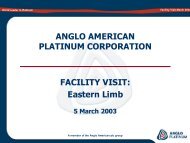
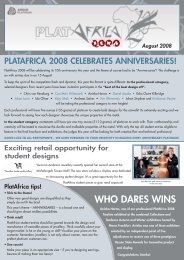
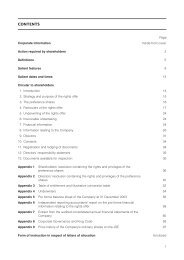
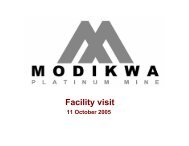
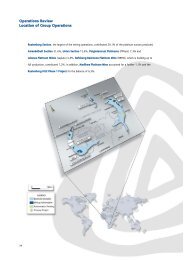

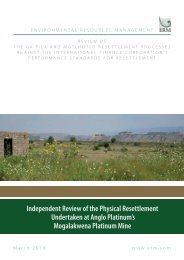

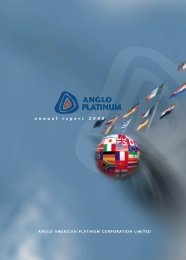
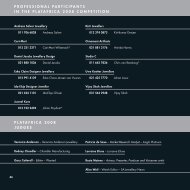
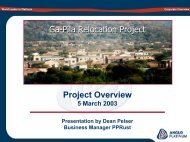
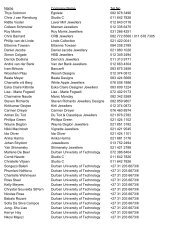
![[PDF] Mogalakwena Mine - Anglo Platinum](https://img.yumpu.com/43065142/1/184x260/pdf-mogalakwena-mine-anglo-platinum.jpg?quality=85)
